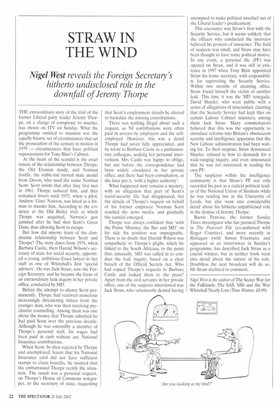STRAW IN THE WIND
Nigel West reveals the Foreign Secretary's hitherto undisclosed role in the downfall of Jeremy Thorpe
THE extraordinary story of the trial of the former Liberal party leader Jeremy Thorpe, on a charge of conspiracy to murder, was shown on ITV on Sunday. What the programme omitted to mention was the equally bizarre set of circumstances that set the prosecution of the century in motion in 1979 — circumstances that have political repercussions for Tony Blair's Cabinet.
At the heart of the scandal is the exact nature of the relationship between Thorpe, the Old Etonian dandy, and Norman Josiffe, the stable-lad turned male model from Devon, who used the name Norman Scott. Scott insists that after they first met in 1961, Thorpe seduced him, and they remained lovers until 1975, when a pilot, Andrew 'Gino' Newton, was hired as a hitman to murder him. According to the evidence at the Old Bailey trial, at which Thorpe was acquitted, Newton's gun jammed after he had shot Scott's Great Dane, thus allowing Scott to escape.
But how did anyone learn of the clandestine relationship between Scott and Thorpe? The story dates from 1974, when Barbara Castle, then Harold Wilson's secretary of state for social security, appointed a young, ambitious Essex lawyer to her staff as one of Whitehall's first 'special advisers'. He was Jack Straw, now the Foreign Secretary, and he became the focus of an extraordinary leak inquiry in her private office, conducted by MI5.
Before the attempt to silence Scott permanently, Thorpe had received numerous increasingly threatening letters from the younger man, who was then receiving psychiatric counselling. Among them was one about the money that Thorpe admitted he had paid Scott over the previous decade. Although he was ostensibly a member of Thorpe's personal staff, his wages had been paid in cash without any National Insurance contributions.
When Scott, by then rejected by Thorpe and unemployed, learnt that his National Insurance card did not have sufficient stamps to claim benefits, he insisted that the embarrassed Thorpe rectify the situation. The result was a personal request, on Thorpe's House of Commons notepaper, to the secretary of state, requesting that Scott's employment details be altered to backdate the missing contributions.
There was nothing illegal about such a request, as NI contributions were often paid in arrears by employers and the selfemployed. However, this was a detail Thorpe had never fully appreciated, and he wrote to Barbara Castle as a parliamentary colleague, seeking her personal intervention. Mrs Castle was happy to oblige, but not before the correspondence had been widely circulated in her private office, and there had been consultation, as she later put it, 'with a higher authority'.
What happened next remains a mystery, with an allegation that part of Scott's social-security file had disappeared, but the details of Thorpe's request on behalf of his former employee Norman Scott reached the news media, and gradually the scandal emerged.
Thorpe was always confident that with the Prime Minister, the Bar and MI5' on his side his position was impregnable. There is no doubt that Harold Wilson was sympathetic to Thorpe's plight, which he linked to the South Africans, to the point that, unusually, MI5 was called in to conduct the leak inquiry, based on a clear breach of the Official Secrets Act. Who had copied Thorpe's requests to Barbara Castle and leaked them to the press? Apart from the civil servants in her private office, one of the suspects interviewed was Jack Straw, who vehemently denied having attempted to make political mischief out of the Liberal leader's predicament.
This encounter was Straw's first with the Security Service, but it seems unlikely that the officers who conducted the interview believed his protests of innocence. The field of suspects was small, and Straw may have been thought to have some political motive. In any event, a personal file (PF) was opened on Straw, and it was still in existence in 1997 when Tony Blair appointed Straw his home secretary, with responsibility for supervising the Security Service. Within two months of attaining office, Straw found himself the victim of another leak. This time it was the MI5 renegade, David Shayler, who went public with a series of allegations of misconduct, claiming that the Security Service had kept files on certain Labour Cabinet ministers, among them Jack Straw. Many commentators believed that this was the opportunity to introduce reforms into Britain's obsolescent security and intelligence apparatus that the New Labour administration had been waiting for. To their surprise, Straw denounced Shayler, refused to bow to demands for a wide-ranging inquiry, and even announced that he was not interested in reading his own PF.
The suspicion within the intelligence community is that Straw's PF not only recorded his past as a radical political leader of the National Union of Students while he was reading law at the University of Leeds, but also went into considerable detail about his hitherto unpublicised role in the demise of Jeremy Thorpe.
Barrie Penrose, the former Sunday Times investigator who has pursued Thorpe in The Pencourt File (co-authored with Roger Courtier), and more recently in Rinka gate (with Simon Freeman), and appeared as an interviewee in Sunday's programme, has described Jack Straw as a crucial witness, but in neither book went into detail about the nature of his role. Doubtless the next broadcast will do so. Mr Straw declined to comment.
Nigel West is the author of The Secret War for the Falklands: The SAS, MI6 and the War Whitehall Nearly Lost (Time Warner, 1'8.99).


























































 Previous page
Previous page